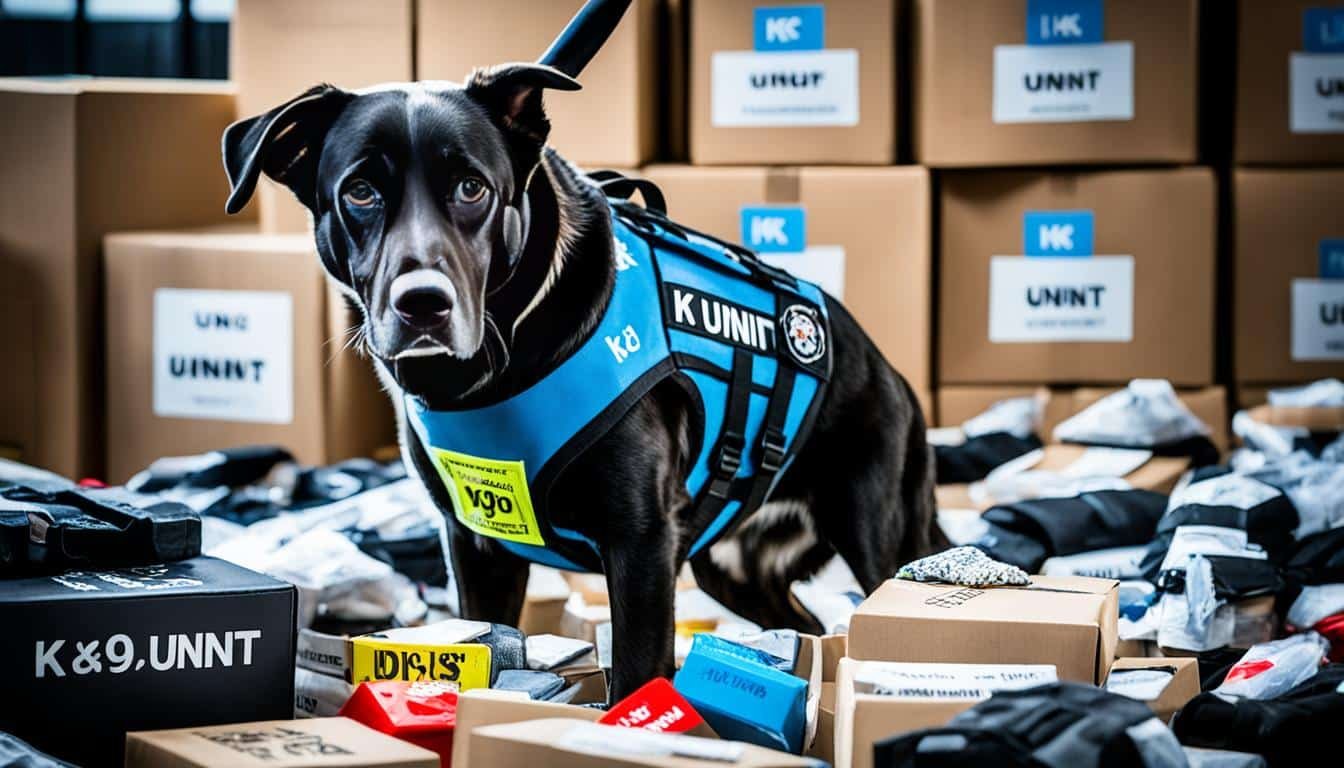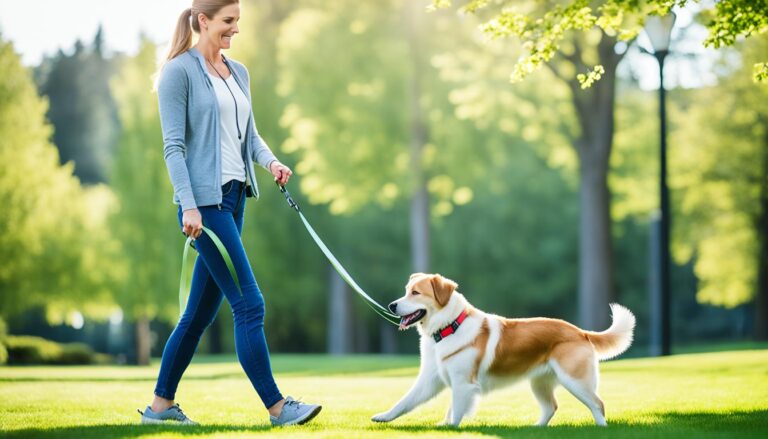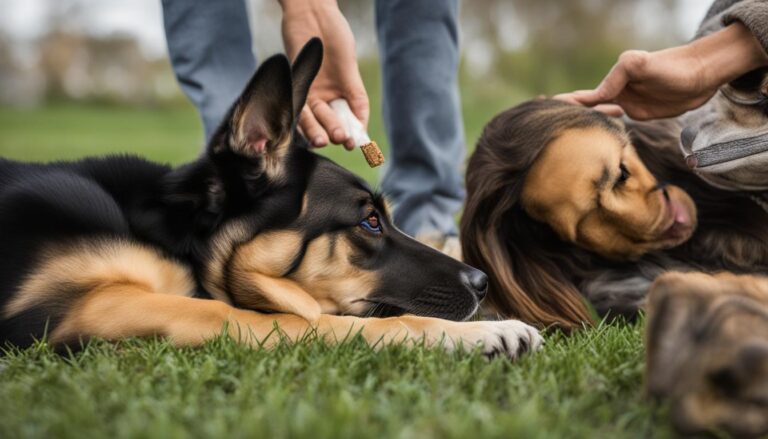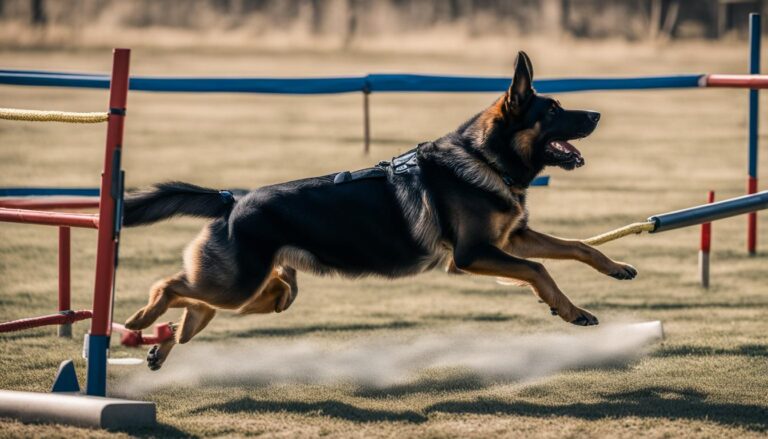What Are Sniffer Dogs Trained to Smell
Picture this: you’re walking down a bustling city street, surrounded by the sounds of honking cars and the chatter of pedestrians. Amidst the chaos, a sniffer dog struts confidently by your side, its focused gaze scanning the environment, nostrils twitching with anticipation. In that moment, you can’t help but marvel at the remarkable abilities of these four-legged heroes.
Sniffer dogs, also known as detection dogs, possess an extraordinary talent that sets them apart from their human counterparts – an incredibly powerful sense of smell. Their canine olfactory system is an intricate masterpiece, capable of detecting scents that are virtually imperceptible to humans.
Whether it’s sniffing out explosives, illegal drugs, or even the scent of endangered wildlife, sniffer dogs have become indispensable assets in various domains. Their training equips them to distinguish between a myriad of scents, enabling them to play a vital role in law enforcement, wildlife research, agriculture, and even combating the COVID-19 pandemic.
Join us on a captivating journey as we delve into the world of sniffer dogs, exploring their training, abilities, and the incredible impact they have on our lives. Discover how these remarkable canines harness their extraordinary sense of smell to keep us safe, protect our environment, and contribute to scientific advancements.
The Role of Sniffer Dogs in Law Enforcement
Sniffer dogs play a crucial role in various law enforcement activities. They are extensively trained to assist in drug raids, locate missing criminals, and uncover hidden stashes of currency. These highly skilled canines are invaluable assets in the field of drug detection, with the ability to identify a wide range of substances.
- They are trained to detect drugs such as marijuana, cocaine, crack cocaine, heroin, ecstasy, methamphetamine, ketamine, and LSD.
- Sniffer dogs are also equipped with impressive explosive detection skills, capable of identifying explosives, firearms, and other dangerous contraband items like mobile phones.
Law enforcement agencies rely on sniffer dogs for their exceptional olfactory capabilities and remarkable training. These canine partners provide an effective means of combating drug trafficking, ensuring public safety, and enhancing the efficiency of law enforcement operations.
The Training Process
Training sniffer dogs for law enforcement purposes involves a rigorous and specialized process. Handlers utilize reward-based methods to teach the dogs to associate specific scents with positive reinforcement, typically in the form of toys or treats. This association allows the dogs to identify and alert their handlers to the presence of targeted substances or explosives.
Working in Law Enforcement
Once trained, sniffer dogs become integral members of law enforcement teams. They assist in drug raids, search for hidden contraband, and help locate individuals involved in criminal activities. Their unparalleled sense of smell enables them to detect minute traces of substances, even in challenging environments.
Law enforcement agencies treat their sniffer dogs with utmost care and respect, ensuring their well-being and providing regular training to maintain their skills. These highly trained animals serve as powerful tools in combating crime and keeping communities safe.
Wildlife Research and Invasive Species Detection
Sniffer dogs have proven to be essential tools in wildlife research and the detection of invasive species. They are trained to locate and collect the feces of various species, including caribou, black-footed ferrets, killer whales, and Oregon spotted frogs. This process, known as wildlife scat detection, provides valuable data without invasive methods like live-capture. Sniffer dogs excel in invasive species detection, identifying infestations of non-native weeds and organisms like quagga mussels.
By detecting wildlife scat, sniffer dogs play a crucial role in understanding animal behavior, population dynamics, and ecosystem health. They can identify the presence of endangered or elusive species, helping conservationists track and monitor their movements. This non-invasive approach minimizes disturbance to wildlife habitats and reduces stress on the animals being studied.
Identifying Invasive Species and Their Impact
Invasive species pose a significant threat to ecosystems and native biodiversity. By introducing non-native plants, animals, and organisms into new environments, these species can outcompete native species, disrupt ecological balance, and cause widespread damage. Sniffer dogs are instrumental in detecting invasive species at an early stage, allowing for effective intervention and management.
With their keen sense of smell, sniffer dogs can identify the presence of invasive plants, such as knapweed and purple loosestrife, which can rapidly spread and dominate native vegetation. They can also detect invasive animals like zebra mussels, which can cause ecological havoc by depleting food sources and disrupting the natural food chain. By promptly detecting and monitoring these species, sniffer dogs aid in preventing their establishment and minimizing environmental damage.
In conclusion, wildlife scat detection and invasive species detection are two critical areas where sniffer dogs prove their value. Their ability to locate and collect wildlife scat helps researchers gather essential data while minimizing disruption to animals. Additionally, their effectiveness in identifying invasive species contributes to the preservation of native ecosystems and enables targeted management strategies.
Detection Dogs in Bed Bug Detection
When it comes to detecting bed bugs, sniffer dogs are invaluable. These specially trained dogs have an extraordinary sense of smell that enables them to locate bed bugs in various hiding places, such as wall voids, crevices, and furniture gaps. Their heightened olfactory abilities allow them to detect bed bugs in parts per trillion, making them highly effective in tracking these pests throughout their life cycle.
The use of detection dogs in bed bug detection offers a non-invasive method that has proven to be particularly helpful in combating the increasing prevalence of bed bugs. By relying on the dogs’ keen senses instead of relying solely on pesticide use, we can reduce environmental impact while effectively managing these troublesome insects.
Thanks to their exceptional training and scent detection skills, bed bug detection dogs play a crucial role in identifying and locating bed bug infestations. Their ability to pinpoint the presence of these tiny creatures ensures that proper measures can be taken to eliminate the problem and prevent further spread.
Whether it’s in hotels, residential buildings, or other public spaces, the deployment of bed bug detection dogs provides an efficient and reliable solution to tackle the challenges associated with these pesky pests. By utilizing the remarkable abilities of detection dogs, we can ensure more effective and targeted bed bug control strategies.
As bed bug infestations continue to pose a problem, the use of detection dogs offers a proactive and eco-friendly approach to address the issue. The remarkable skills of these dedicated dogs contribute to creating a healthier and pest-free environment for everyone.
Training and Abilities of Narcotics Detection Dogs
Narcotics detection dogs undergo intensive training to become experts in sniffing out controlled substances. These highly skilled canines are trained to associate specific odors, such as those of cocaine, heroin, methamphetamine, and marijuana, with their training toys. For these dogs, finding the odor of these narcotics is equivalent to finding their beloved toys, motivating them to search diligently.
During their training, narcotics detection dogs learn to perform specific behaviors called alerts, which vary depending on the individual dog and training program. Common alert behaviors include sitting, scratching, or standing still when they detect the targeted odor. By signaling the handler, the dog can effectively communicate the presence of narcotics.
However, it’s important to note that detection dogs solely alert to the presence of odors, not the actual presence of substances themselves. This means that there can be limitations to their accuracy. Factors such as residual odors from previous contacts or the packaging methods used to conceal narcotics can affect their performance. Additionally, detection dogs may have difficulties distinguishing between various quantities of narcotics, making it challenging to determine if a significant amount is present.
Overall, the abilities of narcotics detection dogs are impressive, and their training allows them to make significant contributions in law enforcement efforts to combat drug-related crimes. However, it’s crucial to understand the limitations of these dogs and take them into account when interpreting their alerts.
Limitations of Narcotics Detection Dogs
- Residual Odors: Detecting residual odors from previous drug contact can lead to false positives.
- Packaging Methods: Narcotics concealed in airtight containers or vacuum-sealed packaging may be challenging for detection dogs to detect.
- Varied Quantities: Dogs have difficulties discerning between small quantities and significant amounts of narcotics.
- Environmental Factors: High levels of distracting odors in certain environments can hinder a dog’s ability to focus on targeted scents.
- Handler Influence: Dogs can be influenced by their handlers’ expectations and unintentionally provide false alerts.
Understanding these limitations is crucial for law enforcement and legal professionals, as it helps to accurately interpret the signals given by narcotics detection dogs. Adequate training, ongoing evaluation, and strict protocols can help mitigate these limitations and ensure the reliability and effectiveness of these remarkable canine partners in the fight against drug-related crimes.
Drug Detection Dog Searches and Your Rights
When it comes to drug detection dog searches, it’s important to understand your rights and the legal implications surrounding these searches. The legality and your rights may vary depending on the specific situation. Let’s take a closer look at how drug-sniffing dog searches are regulated and what you should know.
Drug-Sniffing Dog Searches during Traffic Stops
During a routine traffic stop, law enforcement officers typically require a warrant or valid probable cause to conduct a search using a drug-sniffing dog. This means that they must have a reasonable belief that a crime has been or is being committed. If the dog alerts to the presence of drugs, it may provide the officer with probable cause to search your vehicle.
Airport Searches and Drug-Sniffing Dogs
The rules surrounding drug-sniffing dog searches are different in places like airports. In these instances, a drug-sniffing dog can investigate your luggage without suspicion or probable cause, as it is not considered a search. This is due to the fact that airports are considered high-security areas where individuals have a reduced expectation of privacy.
Know Your Rights
If you find yourself subjected to a drug detection dog search, it is essential to know your rights. Understanding your rights can help protect you during these encounters. If you believe your rights have been violated, it is advisable to consult legal representation to explore your options.
- Remain calm and do not interfere with the search.
- Do not consent to a search if you are asked by law enforcement, unless they have a warrant.
- Ask if you are free to leave. If you are, you can choose to end the encounter.
- Document the encounter, including the date, time, location, and the officers’ names and badges.
Remember, maintaining composure and understanding your rights can help protect your interests during drug detection dog searches.
Detection Dogs in Agricultural and Environmental Fields
Detection dogs are not limited to law enforcement and wildlife research; they also play a significant role in the agricultural and environmental fields. These highly trained canines have proven to be valuable assets in safeguarding agricultural crops, identifying invasive species, and detecting ecological threats.
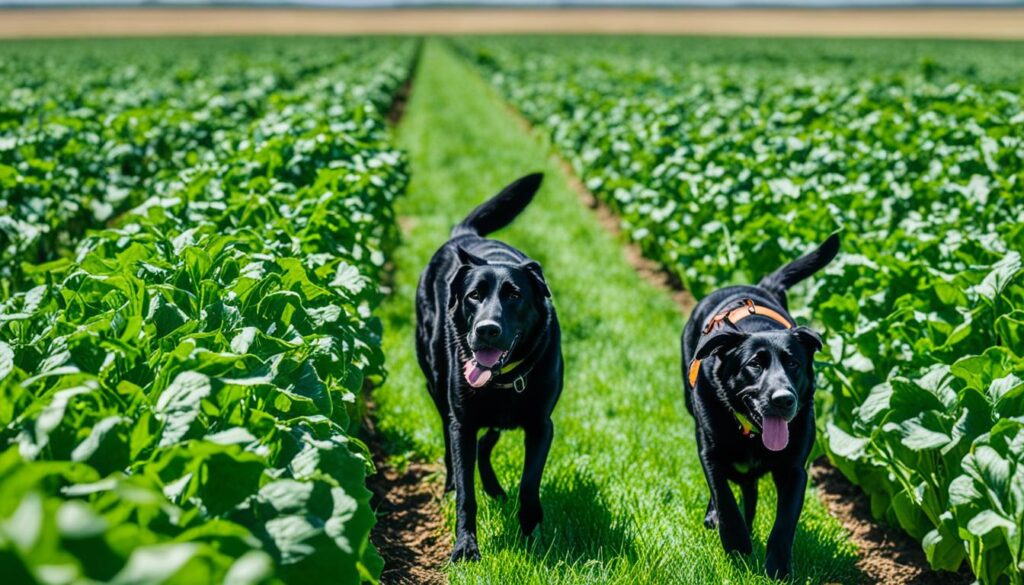
In agriculture, detection dogs are trained to detect crop pests and diseases, such as citrus greening disease. With their keen sense of smell, they can identify infected trees with high accuracy, allowing for early detection and prevention measures to be implemented. By detecting and isolating infected plants, these dogs contribute to the protection and preservation of vital agricultural crops.
In the environmental field, detection dogs are utilized to locate and identify invasive plants, harmful pests, and other ecological threats. Their sense of smell enables them to quickly detect the presence of invasive species, helping ecologists and conservationists take appropriate measures to mitigate their impact. These dogs play a crucial role in maintaining and restoring the balance of natural ecosystems.
The use of detection dogs in agriculture and the environment showcases their versatility and effectiveness in a wide range of applications. Whether it’s protecting crops or preserving natural habitats, these intelligent and highly trained canines contribute significantly to the advancement of these fields.
Dogs Trained to Detect COVID-19
In the fight against the COVID-19 pandemic, some countries have turned to a unique ally: dogs. These remarkable animals have been trained to detect the presence of the virus by sniffing out specific scents associated with the infection. Their incredible sense of smell allows them to identify symptomatic and asymptomatic cases with impressive accuracy, making them valuable tools in the battle against the spread of the virus.
Studies have shown that COVID-19 detection dogs can effectively identify individuals who are infected, even before symptoms manifest. This non-invasive and rapid testing method holds great promise and has the potential to be utilized for mass pre-testing in various settings such as airports, harbors, and cultural activities.
By harnessing the extraordinary olfactory abilities of these trained dogs, authorities can quickly and efficiently screen individuals for the virus, helping to prevent its spread in high-risk environments. The use of COVID-19 detection dogs complements traditional testing methods and offers an additional layer of protection and early detection.
Benefits of COVID-19 detection dogs:
- Rapid and non-invasive testing method
- High accuracy in identifying infected individuals
- Potential for mass pre-testing in various settings
- Complementary to existing testing methods
- Early detection and prevention of virus spread
The efforts to train dogs to detect COVID-19 highlight the incredible versatility of these animals and their potential to contribute to public health and safety in unprecedented ways. As research and training continue, the role of COVID-19 detection dogs may become even more significant in the ongoing battle against the pandemic.
Criticism and Limitations of Sniffer Dogs
In the realm of utilizing sniffer dogs, there have been both criticisms and limitations that have come to light. One main concern is the accuracy of these dogs in their detection abilities. Factors such as handler biases and residual odors can impact the reliability and effectiveness of sniffer dogs in various scenarios.
Additionally, civil rights concerns have been raised in relation to the use of sniffer dogs for searches. There is the potential for searches to be conducted without proper cause or regulation, which raises questions about privacy and individual rights. It is crucial to address these concerns and ensure the ethical use of sniffer dogs.
To mitigate these issues, it is necessary to implement proper training, certification, and oversight mechanisms. By providing comprehensive training programs and rigorous certification processes, we can enhance the accuracy of sniffer dogs and minimize the impact of potential biases. Furthermore, implementing clear regulations and guidelines for the use of sniffer dogs can help safeguard civil rights while still reaping the benefits of their detection capabilities.
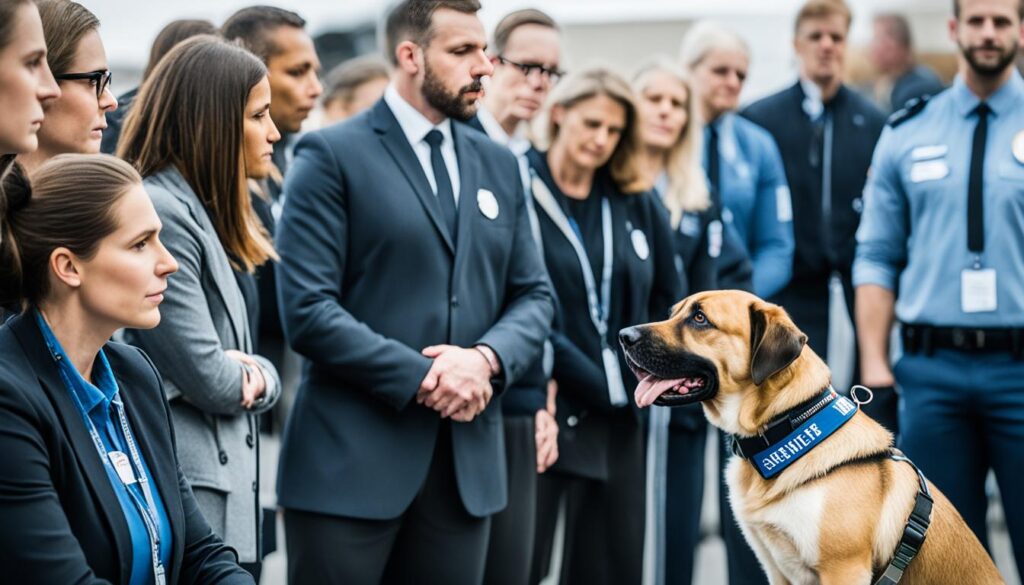
Addressing the accuracy of sniffer dogs and civil rights concerns is essential to ensure the effective and ethical use of these highly specialized canines. By acknowledging and proactively addressing these limitations, we can continue to harness the unique skills and abilities of sniffer dogs while respecting individual rights and maintaining a fair and just legal system.
The Importance of Consistent Training for Detection Dogs
Consistent and ongoing training is crucial for detection dogs to maintain their skills and accuracy. Without consistent training, detection dogs may become unreliable and ineffective in carrying out their tasks. Training sessions focus on teaching dogs to recognize and respond to specific odor cues, ensuring that they can accurately detect and identify target substances.
During training, dogs are exposed to various scents associated with the substances they are trained to find. Through repetition and positive reinforcement, they learn to associate these scents with a rewarded behavior, such as sitting or alerting their handler. This reinforcement strengthens the bond between the target odor and the desired response, reducing the risk of false alarms or the detection of unwanted odors.
Consistency in training also helps detection dogs to overcome distractions and perform their tasks in different environments. By exposing them to various scenarios and settings, dogs learn to focus on their olfactory work regardless of the surrounding distractions. This adaptability is essential for detection dogs working in dynamic and demanding environments, such as airports, border crossings, or crime scenes.
Additionally, consistent training ensures that detection dogs remain up to date with new odor profiles or target substances. As new drugs or explosives are developed, it is essential to train dogs to detect these emerging threats. Ongoing training allows for the continuous refinement of detection dog skills and the expansion of their capabilities.
Consistent training is vital for detection dogs as they play significant roles in various fields, including law enforcement, conservation, and public safety. Their ability to detect illegal drugs, explosives, wildlife scat, or invasive species is invaluable in protecting communities, safeguarding wildlife, and maintaining ecological balance.
Certification and Regulation of Detection Dog Teams
The certification and regulation of detection dog teams play a crucial role in maintaining standards and ensuring the reliability of their services. National organizations such as the World Detector Dog Organization (WDDO) and the National Entomology Scent Detection Canine Association (NESDCA) provide certifications for bed bug detection dogs. These certifications guarantee that both the dogs and their handlers meet specific training and performance criteria.
By obtaining these certifications, detection dog teams demonstrate their competence and professionalism in the field. The rigorous training programs and assessments required for certification ensure that the teams are proficient in detecting bed bugs accurately and efficiently. This process instills confidence in clients who seek the services of these specially trained dogs for bed bug inspections.
Moreover, independent K9 bed bug inspection companies may hold multiple certifications, further emphasizing their commitment to quality and excellence. These certifications serve as proof of their expertise and adherence to industry standards, making them a reliable option for those in need of effective bed bug detection services.
Regulation and certification also serve as a means of accountability. They establish guidelines and protocols to ensure the ethical and responsible use of detection dogs in various settings. Compliance with these regulations promotes transparency, protects the rights of individuals, and fosters public trust in the abilities of detection dog teams.
Partnering with Sniffer Dogs in Legal Defense
If you find yourself facing charges related to the possession of an illegal substance, it is important to understand the role that sniffer dog searches can play in your legal defense. Consulting with a drug and criminal defense attorney is crucial in such circumstances. These professionals can meticulously review the details of the search that led to your arrest, ensuring that your rights were not violated during the use of a drug-sniffing dog or by law enforcement officers.
A skilled attorney specializing in drug and criminal defense can advise you on possible violations of your rights during the search. They can help build a strong defense using their expertise and extensive knowledge of the law. By thoroughly assessing the circumstances surrounding the search, they can determine if any potential violations or irregularities occurred, which can be crucial in your defense strategy.
Partnering with a qualified attorney can make a significant difference in your legal defense. They will work diligently to protect your rights and ensure fair treatment throughout the legal process. By leveraging their experience and insights, they can effectively challenge the evidence presented against you, including any questionable or unlawful search conducted with the assistance of a drug-sniffing dog.
